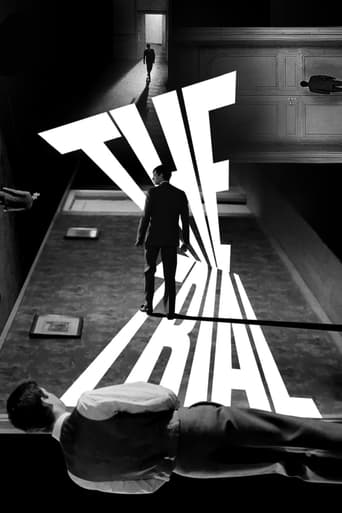StuOz
An office worker must go to trial...but he is never told what he did wrong.This and Citizen Kane are my two favourite Orson Welles movies.This film is about a guy's dream or nightmare. That is what you need to know from the start. Once you are fine with that it all comes together. I have had nightmares that look like this film, in every way (the extra large doors, people packed together in a large room, etc) . So I have a special bond with this flick.The Trial is a movie you only need to see once or twice in a lifetime, if you see it too many times it starts to feel a bit dull. Instead of being called entertainment, this movie can be called a totally unique experience that you will never forget.
bkoganbing
I think filming Franz Kafka is probably more difficult than filming Ernest Hemingway. Getting all the meaning out of Hemingway's sparse prose has certainly been a challenge. But with Kafka and The Trial, how do you film inside a man's mind in an unnamed existential world?Well Orson Welles certainly gave it a try. The first time I watched The Trial I started a few times and gave up. I was determined to see it through and did this time. I did see it through and came away still not sure of what I saw.Anthony Perkins is the protagonist Jozef K. He's a nameless toiler in what Kafka correctly sees as a future age of information. Had the film been done today you would see Perkins as a nameless drone chained to a computer. But he's done something that has whatever authority there is most upset. He's under arrest though for a moment free on some futuristic version of bail on an unnamed charge.Civil liberties have certainly gone out the window. Kafka was not writing about an Anglo-Saxon society where one's innocent until proved guilty. Guilty as charged with little or no chance of proving yourself innocent.I'm not sure Welles had any fixed notions about filming this in the way he firmly knew his mind with his other and better films. He was experimenting here with some stream of consciousness type technique and I think he was attempting the impossible. He wrote some interesting vignettes for people Jeanne Moreau, Romy Schneider, and Akim Tamiroff who offer varying degrees of sympathy for Perkins's plight, but all can really do nothing.The Trial is an interesting experiment, but it doesn't make it in my book.
RpF88
This film has a surrealistic language, a transcendentalist style, Wells' iconoplasticism, Kafka's philosophical anthropology, poetic imaging, and existentialist reflection.It is historically, culturally, politically and philosophically relevant.It is also relevant for cinematography studies (for its brilliant use of different lenses, lighting and composition of the shots), for actor directing studies (for the non naturalistic performances that make the film consistent) and film directing studies (for the non transparency of the style, representation and meaning).It should be in the top of the IMDb list so that everyone could know that they should absolutely see it as soon as possible.It is a remarkable achievement in film
kurosawakira
Welles was able to finish to his liking only eight projects, of which this is one. Others were taken away from him, most of them butchered by the studio and producers. That's only eight films during a period of 37 years. All of this because of one citizen Kane.It's a real tragedy that Welles would be unable to finish most of the things he worked on after this, the two sweet expectations being "Chimest at Midnight (1965) and "F for Fake" (1973), the latter which I think is his best film (whatever that means). No wonder then that Welles found such a resounding autobiographical level in this, and in retrospect considered it to be his best film.I'm not at all into reading too much into the lives of filmmakers as some kind of key to understanding and enjoying their work, but this case is different. Keeping in mind that here we have a self-confessed best film of a genius whose art was largely taken away from him, the final image of the huge open doors, Welles narrating the credits and saying "I'm Orson Welles" is as scintillating a moment one can get. The simplest of moments, but full of such release, dreaming and justice, such final resolve that it's overpowering.A refined work of dazzling visual mastery, assured and lucid. Welles is a revolutionary, not only a master of the eye, what we see, but also a master of editing. He's so radically different from anything I've ever seen that not even Wong, the modern maven, quite compares.And remember what money this has been made with! The space, basically that empty building, exhaustively utilized. Everything works, since all is out of joint, Perkins embodying this feeling of disconnect, stuttering around with strange confidence, emphasizing Kafka's bleakly hilarious and oppressively suffocating atmosphere that only he can paint.A puzzle, sure; a labyrinth, most certainly.





